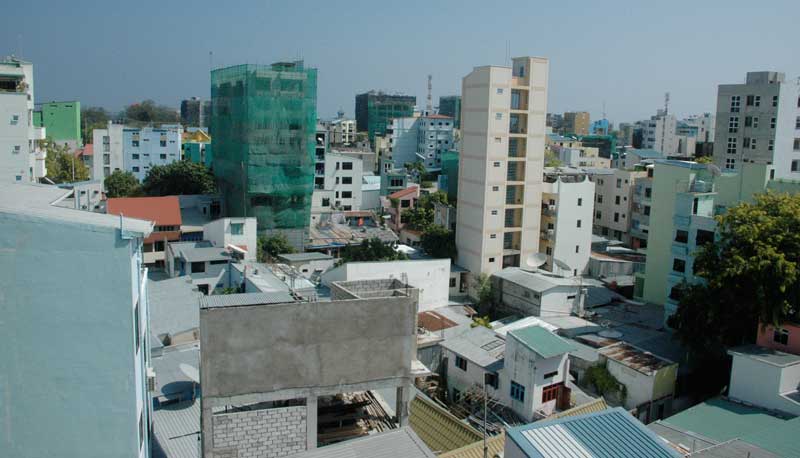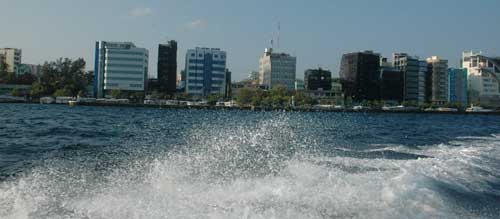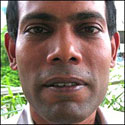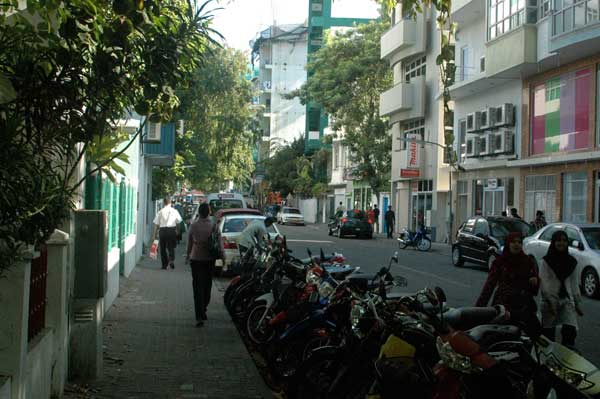SWEDISH SOUTH ASIAN STUDIES NETWORK
The Maldives
 Official
name: Republic of Maldives (Dhivehi Raajjeyge Jumhooriyyaa)
Official
name: Republic of Maldives (Dhivehi Raajjeyge Jumhooriyyaa)
Area: 298 sq km. The country consists of 1,200 coral islands –
out of of which 201 are inhabited – grouped in a double chain of
twenty-seven atolls. Most atolls are ringshaped coral reefs supporting
five to ten inhabited islands and twenty to sixty uninhabited islands.
Average size of islands one to two kilometers and height of 1.5 meters
above sea level. Highest spot is 3 meters above sea level.
Population: 339 330 (est. July 2004)
Population growth rate: 2.86 p.c (est. 2004)
Life expectancy at birth: 63.68 years (est. 2004)
 Ethnic Groups: Homogeneous mixture of Sinhalese, Dravidian, Arab,
Australasian, and African groups; also small group of Indian traders
Ethnic Groups: Homogeneous mixture of Sinhalese, Dravidian, Arab,
Australasian, and African groups; also small group of Indian traders
Languages: Maldivian Dhivehi (an Indo-Aryan language related to
Elu, Old Sinhalese, but with script derived from Arabic). English, Arabic
and Hindi/Urdu also spoken
Religion: Sunni Muslim Islam (Shafii school of law) state religion.
Some Shia Muslim Indian traders. 724 mosques and 266 special mosques for
women in 1991
Administrative
division: 19 atholhu (atolls) – Alifu, Baa, Dhaalu, Faafu, Gaafu
Alifu, Gaafu Dhaalu, Gnaviyani, Haa Alifu, Haa Dhaalu, Kaafu, Laamu, Lhaviyani,
Meemu, Noonu, Raa, Seenu, Shaviyani, Thaa, Vaavu – and one other
first-order administrative division – Maale
Capital: Male (70 000 inhabitants; 62 973 according to the Census
of 1995)
Date of Independence: July 26, 1965 (from Britain)
System of government: Republic
National anthem: Gavmii Mi Ekuverikan Matii Tibegen Kuriime
Salaam (Lyrics: Wannakuwattawaduge Don Amaradeva. Music: Mohamed
Jameel Didi
Constitution: On Thursday 7 August 2008, the New Constitution of the Republic of Maldives was ratified. Read the functional translation of the Constitution, on http://www.maldivesinfo.gov.mv/home/upload/downloads/Compilation.pdf.
 President: Mohamed Nasheed (photo), Maldivian Democratic Party, since the presidential election held on 28 October 2008.
President: Mohamed Nasheed (photo), Maldivian Democratic Party, since the presidential election held on 28 October 2008.
Chief
of state & Head of Government 1978-2008: Former President Maumoon
Abdul Gayoom held the office during six five-year terms.
Parliament: The Parliament (Majlis) has 77 members. Election to the Majlis was held on 9 May 2009. In a heavily fought battle, more than 400 candidates contested. ![]()
The results show the dominance of the two major political parties; Maldivian Democratic Party (MDP) which came to power in last year’s presidential election and Dhivehi Rayyithunge Party (DRP) which is controlled by the former president Maumoon Abdul Gayoom.
Election results: Party/Votes/Seats
Dhivehi Rayyithunge Party: 40,886 (24.62%) – 28 seats
Maldivian Democratic Party: 51,184 (30.81%) – 26 seats
People's Alliance: 8,283 (4.99%) – 7 seats
Dhivehi Qaumee Party: 5,854 (3.52%) – 2 seats
Republican Party: 7,001 (4.22%) – 1 seat
Independents: 49,835 (30.00%) – 13 seats
Legal system: Islamic Shari’a applies to civil and criminal cases. Judges are appointed by president; the courts under minister of justice. Since 1996 there exists a Supreme Council for Islamic Affairs. Besides a Supreme Court, four other courts in Male and 200 island courts.
Currency: 1 rufiyaa (Rf) = 100 laari
GDP – purchasing power parity: 1.25 billion dollars (est
2002)
 Economy:
Tourism, Maldives largest industry, accounts for 20 p.c of GDP and
more than 60 p.c of the Maldives' foreign exchange receipts. Over 90 p.c
of government tax revenue comes from import duties and tourism-related
taxes. Almost 400,000 tourists visited the islands in 1998. Fishing is
a second leading sector. Most staple foods must be imported. Industry
accounts for about 18 p.c of GDP: Fish processing, tourism, shipping,
boat building, coconut processing, garments, woven mats, rope, handicrafts,
coral and sand mining
Economy:
Tourism, Maldives largest industry, accounts for 20 p.c of GDP and
more than 60 p.c of the Maldives' foreign exchange receipts. Over 90 p.c
of government tax revenue comes from import duties and tourism-related
taxes. Almost 400,000 tourists visited the islands in 1998. Fishing is
a second leading sector. Most staple foods must be imported. Industry
accounts for about 18 p.c of GDP: Fish processing, tourism, shipping,
boat building, coconut processing, garments, woven mats, rope, handicrafts,
coral and sand mining
History: Maldivians consider the introduction of Islam in A.D.
1153 as the cornerstone of their country's history. Except for a brief
period of Portuguese occupation from 1558-73, Maldives remained an independent
Sultanate, but during the later centuries the country fell under Brittish
domination. Full independence was granted in 1965. The British continued,
though, to maintain an air base on the island of Gan in the southernmost
atoll until 1976. The hereditary sultanate was abolished in 1968, when
the Maldives turned into republic.
President Gayoom, in power since 1978, has survived at least three coup
bids. The biggest threat to him came on November 3, 1988 when Sri Lankan
Tamil mercenaries led by a disgruntled Maldivian businessman, Abdullah
Lutufi, tried to storm the capital island and seize power. The
attack was resisted and the mercenaries fled amid news that neighbouring
India had despatched troops in aid of Gayoom and after Sri Lankan police
placed an elite unit of commandos ready for deployment. The Maldives now
celebrates November 3 as National Victory Day. Later, a palace coup that
involved a brother-in-law also fizzled. Gayoom afterwards introduced limited
political reforms though a new constitution in 1998. Until then it had
been a criminal offence to even publicly declare one's intention to seek
the presidency.
On 3 June 2005 the Maldives took a critical
step in its path towards constitutional reform, when
the Majlis decided to open up the political system for the registration
of the parties, pointing to a change in the ground rules for political
engagement. After the June 3 decision, pre-registration of parties
has commenced with three seeking registration.
The Home Ministry, on June 5, approved the ”pre-registration”
of three political parties, the Dhivehi Raiyithunge Party (DRP) led
by President Gayoom; the Dhivehi Raiyithunge Democratic Party led
by Mohammed Nasheed, a historian; and the Islamic Democratic Party led by Omar Naseer, a businessman.
In March 2006, President Maumoon Abdul Gayoom announced the government's Roadmap
for the Reform Agenda Ushering In a Modern Democracy. It promised a new
constitution by June 2007 and the first multi-party elections in October 2008.
In September 2006, the Maldives acceded to the International Covenant on Civil and
Political Rights (ICCPR), the Optional Protocol to the ICCPR, and the International
Covenant on Economic, Social and Cultural Rights. Resistance from conservative
elements within the government and disruptive moves from the opposition threatened
to derail political and judicial reforms.
| More information on The Maldives |
Wikipedia, the free encyclopedia, Maldives
BBC News Country Profile Maldives
Friends of Maldives. Based in Surrey, UK, set up in December 2003 as a Human Rights NGO aimed at increasing awareness of the appalling Human Rights abuses in the Maldives.
New Maldives Country Assistance Strategy, published on January 28, 2008, by the World Bank Group Country Assistance Strategy (CAS).
The Human Development Report 2009 data on Maldives
Official web site of the government of the Maldives
The President’s Office has its own web site, giving information on the nation.
The Library of Congress, USA, offers through its Country Studies Web site detailed Information on all Aspects of Countries round the Globe. Look for Maldives. Information contained in the Country Studies On-Line is not copyrighted and thus is available for free and unrestricted use by researchers. As a courtesy, however, appropriate credit should be given to the series. Unfortunately, though, the information on the Maldives is not updated since August 1994.
World Bank Group/Maldives: Data reports, statistics, projects etc, for the Maldives
CIA – The World Factbook: Maldives
The British Foreign & Commonwealth Office (FCO) advice on safety aspects on travelling to Maldives
The Swedish Government’s Division for Democratic Issues, based at the Ministry of Justice, regularly publishes reports about the human rights situation in countries all over the World. Read the 2007 Report on the Human Rights Situation in Maldives (in Swedish only).
-
SASNET - Swedish South Asian Studies Network/Lund University
Address: Scheelevägen 15 D, SE-223 70 Lund, Sweden
Phone: +46 46 222 73 40
Webmaster: Lars Eklund
Last updated 2010-06-24
